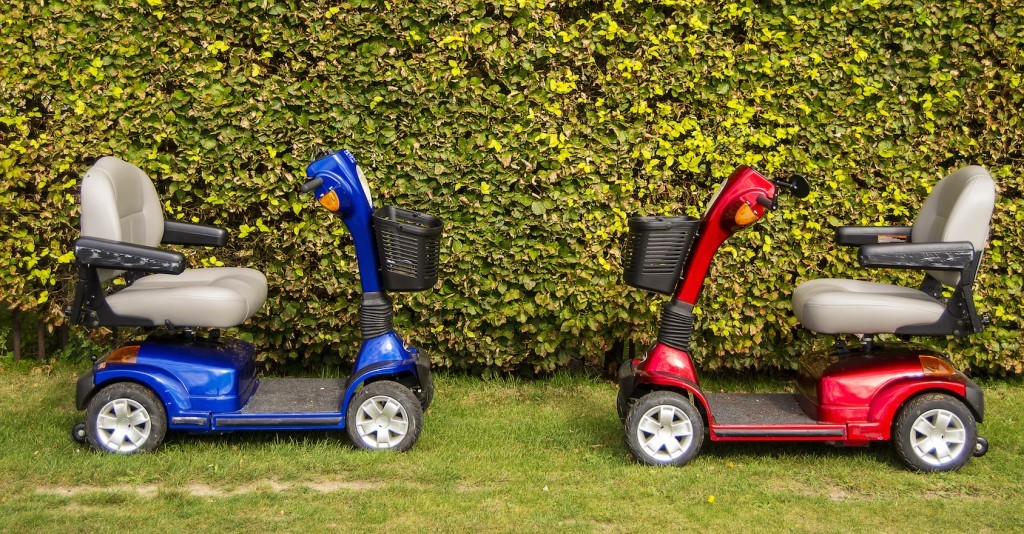Updated October 2025
There are so many scooters out there!
Choosing the right scooter for you or a loved one can be overwhelming, but if you focus on your specific needs, you will narrow down the choices in no time. Below you will find out what you need to know and the questions to ask before you buy.
The standard things to consider when purchasing any scooter include:
- Comfortable seating (seat choices include seats with extra padding, adjustable up and down for longer/shorter legs, and swivel/lock options as well)
- Easy assembly (if you are transporting your scooter in another vehicle, will you need a scooter that disassembles and reassembles easily or do you plan to get a lift)
- Operating range (how many miles the scooter can go before needing a battery recharge – depending on the model, this will be between 7-25 miles)
- Turning radius (how easy it is to turn around in tight spaces – expressed in inches, look for a range between 30-55)
- Location of primary use (indoors or outdoors)
- Size (whether small for indoor use or larger for outdoor use, it is not unusual to have more than one scooter to handle different situations)
- Weight capacity (how much weight your scooter will need to carry – most will carry between 250-350 lbs)
What are the main types of scooters available and which are the best types for people with differing mobility issues?
There is a wide range of scooters on the market that cater to a wide range of needs. Main types of scooters include:
- 3 Wheel Indoor/Outdoor Scooters: Mostly for inside use.
- 3 Wheel Travel Scooters: They are often the least expensive option, but are more suited to travel than everyday use as they tend to lack many features.
- 3 Wheel Heavy Duty Scooters: Built for larger framed individuals.
- 4 Wheel Indoor: Good choice for comfort, speed and battery range, but will not maneuver as well indoors as a 3-wheel model.
- 4 Wheel Travel Scooters: Good for short trips around town. Easy to take apart and put back together.
- 4 Wheel Heavy Duty Scooters: The largest models of the power scooter, great for outdoors and use on more rugged terrain, like grass.
You also want a good warranty to cover major components of the scooter. Typical scooter warranties will cover the frame, the drive train, electronics and battery. Warranty periods range from 6 months to lifetime. Components that may need regular maintenance or replacement include the battery (expect 300-350 charging cycles before needing replacement), brakes, and tires.
Scooter choices by mobility issues, safety and price
Prices of mobility scooters range from $270 to $5,000 or more. Sturdiness, features, power, and size all affect price. Seniors who rely on insurance to pay for a scooter might want to shop for one that costs $1,300 or less.
You can reduce mobility and safety issues by ensuring you choose the correct scooter for your needs. By identifying where and how you will use your scooter, you can then eliminate the scooters that aren’t appropriate and be left with the right choice for you.
Which model 2025 scooters have the best overall features and durability reviews and records?
Product experts who have reviewed mobility scooters at Reviewed and SafeWise give high marks to the following:
- The Pride Go-Go Elite Traveler is the “best overall” mobility scooter, according to Safewise. It sells for about $1,200.
- The Glashow Mobility Scooter S3 is the “best all-purpose” mobility scooter in the opinion of Reviewed. This foldable scooter is priced at about $1,300.
- The Pride Mobility Go-Go Sport 4-Wheel is Reviewed’s choice for “best ergonomic” mobility scooter. It is available for about $1,650.
- The Vive 3-Wheel, at about $630, is Safewise’s choice for consumers on a budget.
As the top choices of the two review sources are different, seniors should consult the full reviews to help them make their choices. For example, consumers searching for a heavy-duty mobility scooter should compare Reviewed’s choice of the Lagtom 800W 4-Wheel (about $2,200) to Safewise’s recommendation of the Golden Technology Buzzaround EX Extreme 4-Wheel (about $2,000).
Of course, seniors need not confine themselves to those review sites. Forbes offers its own reviews of best mobility scooters, although readers should keep in mind Forbes’ business relationship with scooter manufacturer Golden Technologies.
What safety features are important?
Some scooters come with a seatbelt. Tab Black, who has been certified by the Rehabilitation Engineering and Assistive Technology Society of North America, told Forbes that seatbelts might give seniors a sense of security, but seniors who need a seatbelt to stay in their seats are probably not a good candidate for mobility scooters.
Safety features that might be useful for outdoor scooters include headlights and taillights, flags that enhance visibility, and rearview mirrors. A loud horn might also be useful for traveling in parks where pets and wildlife could cross the rider’s path.
(This article was updated October, 2025.)
